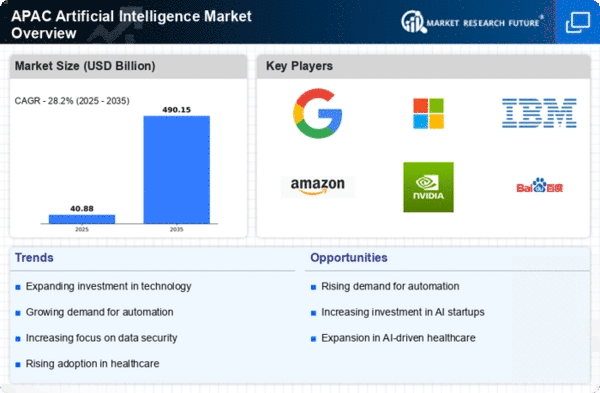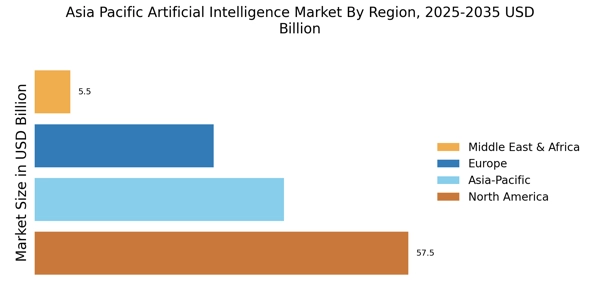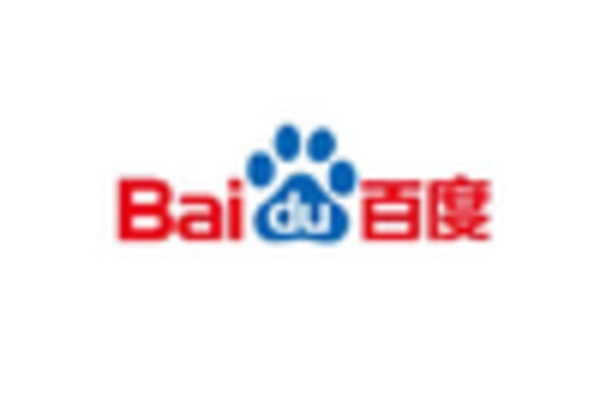China : Unmatched Growth and Innovation
China holds a commanding 12.5% share of the APAC AI market, valued at approximately $50 billion. Key growth drivers include substantial government investment in AI technologies, a robust digital infrastructure, and a rapidly growing consumer base. Demand for AI applications in sectors like healthcare, finance, and manufacturing is surging, supported by favorable regulatory policies that encourage innovation and development. The government's 'New Generation Artificial Intelligence Development Plan' aims to position China as a global AI leader by 2030, fostering an environment ripe for technological advancement.
India : Rapid Growth and Adoption Trends
India's AI market is projected to capture 6.5% of the APAC share, valued at around $25 billion. The growth is fueled by increasing digitalization, a young tech-savvy population, and government initiatives like the National AI Strategy. Demand for AI in sectors such as e-commerce, healthcare, and agriculture is on the rise, with businesses increasingly adopting AI solutions to enhance efficiency. The Indian government is also promoting AI through various funding programs and partnerships with private sectors to boost innovation.
Japan : Blending Tradition with Technology
Japan's AI market holds a 5.0% share in APAC, valued at approximately $20 billion. The country is witnessing growth driven by the integration of AI in traditional industries such as manufacturing and automotive. Government initiatives like the 'Society 5.0' vision aim to create a super-smart society, promoting AI adoption across various sectors. Demand for AI solutions in robotics and automation is particularly strong, reflecting Japan's technological prowess and commitment to innovation.
South Korea : Strong Government Support and Innovation
South Korea accounts for 3.5% of the APAC AI market, valued at around $15 billion. The growth is propelled by significant government investment in AI research and development, alongside a vibrant tech ecosystem. Initiatives like the 'Korean New Deal' emphasize AI as a key driver for economic recovery and innovation. The demand for AI in sectors such as gaming, healthcare, and smart cities is increasing, supported by a strong infrastructure and a competitive business environment.
Malaysia : Strategic Initiatives and Investments
Malaysia's AI market represents 1.5% of the APAC share, valued at approximately $5 billion. The growth is driven by government initiatives like the Malaysia AI Roadmap, which aims to enhance AI capabilities across various sectors. Demand for AI in finance, healthcare, and manufacturing is rising, supported by increasing investments in digital infrastructure. The Malaysian government is actively promoting AI through partnerships with private sectors to foster innovation and development.
Thailand : Focus on Digital Transformation
Thailand's AI market holds a 1.0% share in APAC, valued at around $3 billion. The growth is driven by the government's 'Thailand 4.0' initiative, which emphasizes digital transformation and innovation. Demand for AI solutions in sectors like tourism, agriculture, and healthcare is increasing, supported by a growing startup ecosystem. The Thai government is also encouraging foreign investments in AI technologies to boost local capabilities and competitiveness.
Indonesia : Emerging Opportunities and Challenges
Indonesia's AI market accounts for 1.0% of the APAC share, valued at approximately $3 billion. The growth is driven by increasing internet penetration and a young population eager for technological solutions. Government initiatives like the '100 Smart Cities' program aim to integrate AI into urban planning and services. However, challenges such as infrastructure gaps and regulatory hurdles remain. The demand for AI in e-commerce, agriculture, and fintech is on the rise, reflecting the country's potential.
Rest of APAC : Varied Growth and Adoption Rates
The Rest of APAC region holds a 1.89% share of the AI market, valued at approximately $7 billion. This diverse market includes countries with varying levels of AI adoption and regulatory frameworks. Growth is driven by increasing digitalization and government initiatives aimed at fostering innovation. Demand for AI applications in sectors like agriculture, healthcare, and finance is emerging, with local players and startups gaining traction. The competitive landscape is characterized by a mix of global and regional players, each adapting to local market dynamics.


















